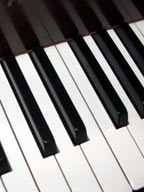
Learning to play music requires discipline: commitment,
perseverance, patience, will, concentration and the capacity to listen, to be
inspired and learn to become better from the example of a teacher, or master.
Raymond Ko, a young innovator and accomplished musician, decided to volunteer in
helping autistic children learn music in his Saskatoon community. He founded the
Music Sensory Awakening Program for children from 3 to 18. For one in 150
Canadians affected with an Autism Spectrum Disorder (ASD), communicating can be
an enormous obstacle and social norms a challenge to decipher.
Over the last two years of taking piano lessons, Raymond’s students have not
only improved their fine motor skills, but also self-esteem and confidence,
doing very well in front of big crowds of people, when participating in
concerts. “The reason why music works as a form of therapy is the structure and
the rigidity of the rhythmic aspect. So much of it has to do with structure. It
helps the students focus,” says Raymond.
Once more, in this great news about exemplary volunteerism, learning music
proves to be beneficial for the disabled. But should we call this method of
“conscious awakening” a therapy? Aren’t children, disabled or not, in school for
the same purpose? To learn to learn on their own, to acquire concentration and
self-discipline?
Curiously, as a civilized society, we are now labelling up to 50% of the youth
in school with various forms of depression, attention deficit and several other
kinds of mental or emotional disorders, rather then providing them with
exemplary education. Somewhere, somehow with our public school systems we have
lost the art of “awakening consciousness”.
Youth, their parents and teachers must rediscover Philosophy in the classical
manner. Its method is like learning music while the instrument becomes one's
own personality. It starts with concentration, a capacity to mobilize the whole
human being: spirit, mind and body around a unique centre of self-conduct. With
discipline and patience one learns to tune and master one’s own personality
harmonizing it in symphony with life.